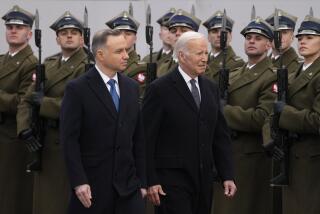A High-Flying Joint Venture With the Polish Army : Aviation: U.S. partners seek $6 million for Air Batory, a civilian airline that will make use of military planes and pilots.
- Share via
WARSAW — Aglow with the free market spirit, the Polish army is going into business with American investors in a venture that propels the concept of airline deregulation to new heights.
The unlikely deal-makers plan to convert a small piece of the Polish military into a privately operated regional “feeder” airline offering cargo and passenger flights to smaller Polish cities.
Air Batory, named after an early Polish king, plans to use idle Soviet-built cargo planes, military landing fields and more than 100 Polish military pilots, navigators, mechanics and other support personnel.
The American partners are now trying to raise $6 million to get the venture off the ground. Delayed repeatedly by bureaucratic hurdles, organizers hope to begin operations this fall under the management of retired U.S. airline executives, headed by Cary E. Smith, former chief pilot and vice president-operations of Delta Air Lines.
Half the profits are to be used for the “cultural” needs of Polish military personnel, government officials say. The other half will go to Consolidated Ventures International of Ann Arbor, Mich., and Krakow, Poland.
The airline scheme is one of the more colorful examples of Eastern Europe’s “privatization” and the unexpected directions it can take.
“It’s the Wild West,” says H. Joseph Pratt, president of the U.S. arm of the joint venture.
Air Batory apparently owes its wings to Polish army Lt. Col. Zbigniew Kusnierek, 37, who persuaded the Ministry of Defense to allow the use of surplus elements of the military for moneymaking purposes to offset the impact of massive budget cuts.
A big share of the military existed to support Soviet troops. People and equipment were idled as the Soviets began to withdraw.
“If the army had abandoned these facilities--airstrips, hangars and so on--they would have sat unused and the army would have had to maintain them at budget expense,” Kusnierek said.
Kusnierek approached Leslaw Kuzaj, a Pole who heads the Krakow-based operations of CVI Poland. CVI put Kusnierek in touch with Harry R. Snoke, a retired Marathon Oil Co. pilot from Findlay, Ohio, who put together a business plan. The new firm is 50% owned by Artwoj, the military foundation created for the purpose, and 50% by CVI.
Artwoj is supplying the venture with a dozen Antonov cargo planes, two years’ worth of spare parts, a network of landing strips and maintenance facilities and more than 100 military personnel who otherwise would be laid off.
The personnel include pilots and navigators who have already received U.S. training in the 24-passenger Grumman G-1 turboprops that will be leased to provide the Warsaw-based passenger service. Cargo operations will fly out of Krakow.
Among the most valuable assets the military brings to the venture are landing rights at airports throughout the region. Nine Polish cities plus Berlin; Prague, Czechoslovakia; Vienna; Budapest, Hungary, and the Soviet cities of Kiev and Minsk are to be served. On the domestic routes, at least, Air Batory will have no competition; Lot Polish Airlines, the state-owned carrier, has dropped its regional service.
Officials admit that customer demand is almost totally unknown because several of the cities haven’t been connected by air service before. But there’s no competition, either, notes CVI’s Pratt.
“Hypothetically, there should be great demand,” he says. “But we project a profit within 18 months based on an occupancy rate of just 30%.”
Woutat reported from Ann Arbor, Mich., and Powers from Warsaw.
More to Read
Inside the business of entertainment
The Wide Shot brings you news, analysis and insights on everything from streaming wars to production — and what it all means for the future.
You may occasionally receive promotional content from the Los Angeles Times.










